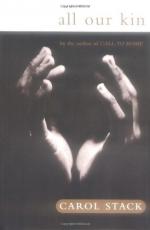|
This section contains 460 words (approx. 2 pages at 400 words per page) |

|
All Our Kin: Strategies for Survival in a Black Community Summary & Study Guide Description
All Our Kin: Strategies for Survival in a Black Community Summary & Study Guide includes comprehensive information and analysis to help you understand the book. This study guide contains the following sections:
This detailed literature summary also contains Topics for Discussion and a Free Quiz on All Our Kin: Strategies for Survival in a Black Community by Carol B. Stack.
It is commonly believed, both by scholars and by laymen, that the ingrained behaviors of the black urban poor are conducive to keeping them poor and a large part of the reason for their apparent lack of economic mobility. However, this study, which is based on direct, face-to-face experience with the black urban poor themselves, shows that far from being conducive to continued poverty, these practices are actually creative responses to dire economic circumstances. The real reason for their lack of social mobility is that the middle and upper-classes, realizing that a subclass of unskilled workers is necessary for the economy, support policies, like welfare, which maintain the status quo rather than policies which would change the economic structures which force the black urban poor into poverty.
The primary problem faced by the black urban poor is a scarcity of resources. In response to this, communities have spontaneously developed an intricate system of exchange known as swapping. Swapping does not generally entail an immediate change of goods. Rather, one person gives another, say, a couch with the expectation that at some point in the future, that person will help him out. The utility of this system is that it protects those members of the community who happen to be facing the harshest financial conditions from ruin, thus maximizing the value of scarce goods.
This flexible system extends not only to material goods but also to the care of children. It is common for a child to be raised by its older sister, an aunt, the father's mother, or even a friend of the mother who is not related to the child by blood. These movements of children can be temporary or permanent. One effect of this behavior is that familial relationships among the black urban poor stray from the paradigms of family organization common in white American culture. The rights and duties of motherhood are not centralized in the biological mother, necessarily, but may be held by the grandmother or even diffused over a number of people who have, at some point, cared for the child.
The economic conditions of the black urban poor also lead to frequent changes in living arrangements. When a bread-winner loses his job or a relative dies, a family may decide to move to a friend's house, or the family may split up among several households. Economic instability also puts a strain on long-term, lasting personal relationships. A woman's relatives will often discourage her from marrying because a husband represents a threat to them continuing to receive money and other goods from the woman. Likewise, a man who loses his job is likely to have feelings of insufficiency and will often respond to them by cheating on his girlfriend or wife.
Read more from the Study Guide
|
This section contains 460 words (approx. 2 pages at 400 words per page) |

|



